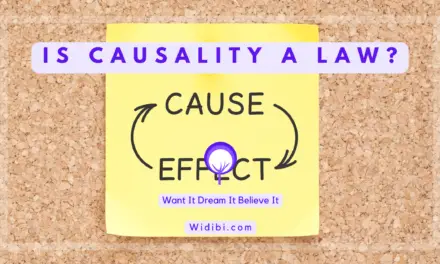[lmt-post-modified-info]
Universal laws, or the laws of the universe, are various unbreakable rules that affect the energies of the universe and govern the relationship between actions that take place within it. They are believed to have existed for as long as the universe itself, which makes sense in the absence of cosmic beings tasked with passing new ones. As such, they have been known, utilized, and manipulated for thousands of years, from ancient cultures all the way through to the modern-day.
Most people have heard of the law of attraction. Some, myself included, utilize that law daily to bring about positive change and progression in our lives. However, the law is nothing if not controversial, and there’s no shortage of detractors – especially among those whose knowledge of the law extends no further than The Secret.
However, the law of attraction, while undoubtedly the most mainstream, is one of 12 universal laws, each of which is equally interesting and powerful. They can work independently – some law of attraction practitioners proceed through life on their own terms without ever even learning that there are 11 other laws out there that are just as potent.
However, for those that are starting from scratch or have only involved themselves with just one or two of them so far, there are plenty of great reasons to develop an understanding of the others.
What are the 12 Universal Laws?
The 12 universal laws dictate a significant amount about how not only the world but the entire universe around us work. They are believed to have remained unchanged since the universe came into being and are just as relevant today as they have been throughout history.
These 12 universal laws are broken down as follows:
1. The Law of Divine Oneness
The first and most important universal law is the law of divine oneness. This law will immediately make any Star Trek fans think of the Borg, a race of interconnected beings. According to this law, the concept is certainly not far-fetched, as it suggests that all things are connected.
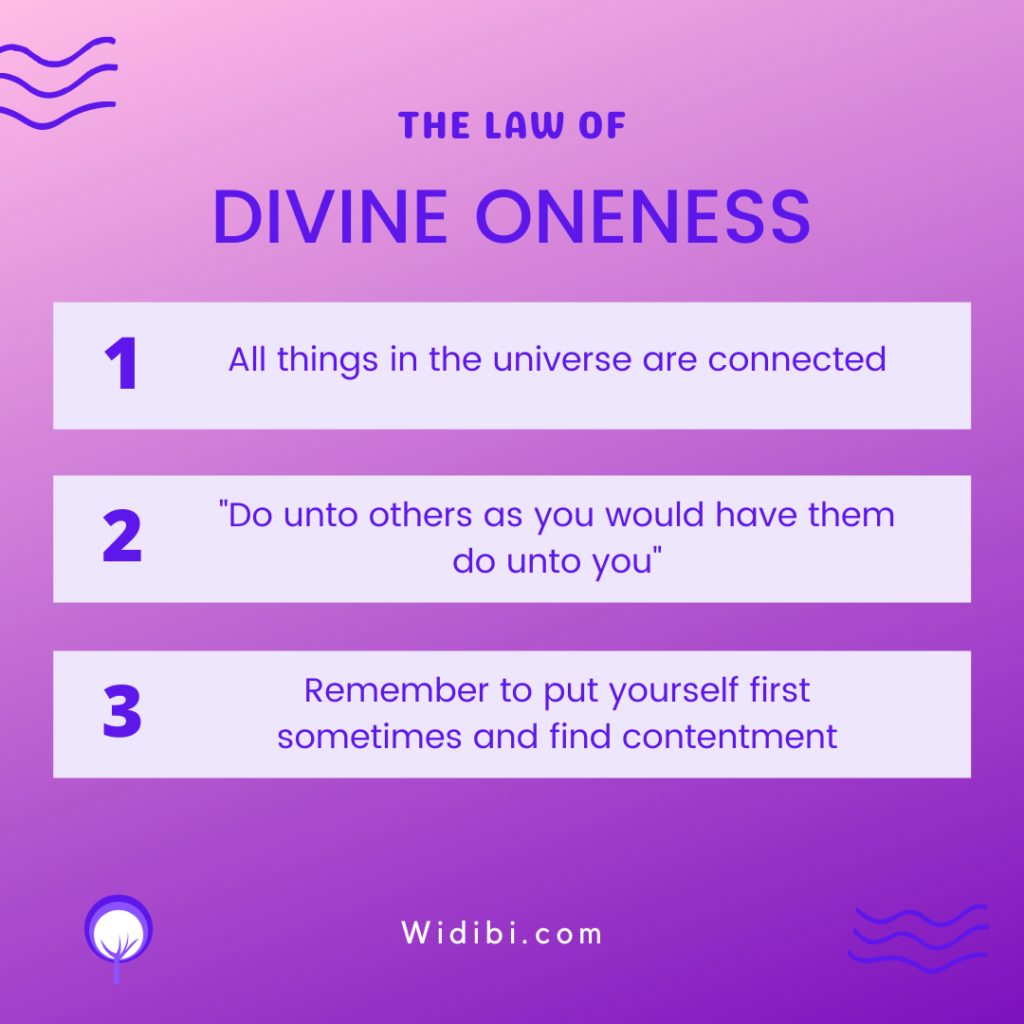
Furthermore, while many living things focus on their immediate surroundings and the information gathered by their individual senses, every thought, action, and emotion is influenced and is connected to everything else.
I’m not a particularly religious person, but I’d compare this law to the famous quote, “do unto others as you would have them do unto you.” Harnessing the law of divine oneness means demonstrating greater empathy, compassion, and understanding of everything around us.
How to Apply the Law of Divine Oneness
I feel that it’s important to put yourself first sometimes, not least because it’s best to ensure that you’re happy and firing on all cylinders before seeking to help others. However, once you find contentment, there’s every reason to start helping others out, and that’s where the law of divine oneness comes into play. Act in love and empathy towards others, and you’ll come closer to making this divine law work on your behalf.
2. The Law of Vibration
The universal law of vibration is often where people find themselves focusing their efforts after mastering the law of attraction. If I were to rank these 12 laws in order of mainstream acceptance and broader knowledge, vibration would come in squarely at number two.
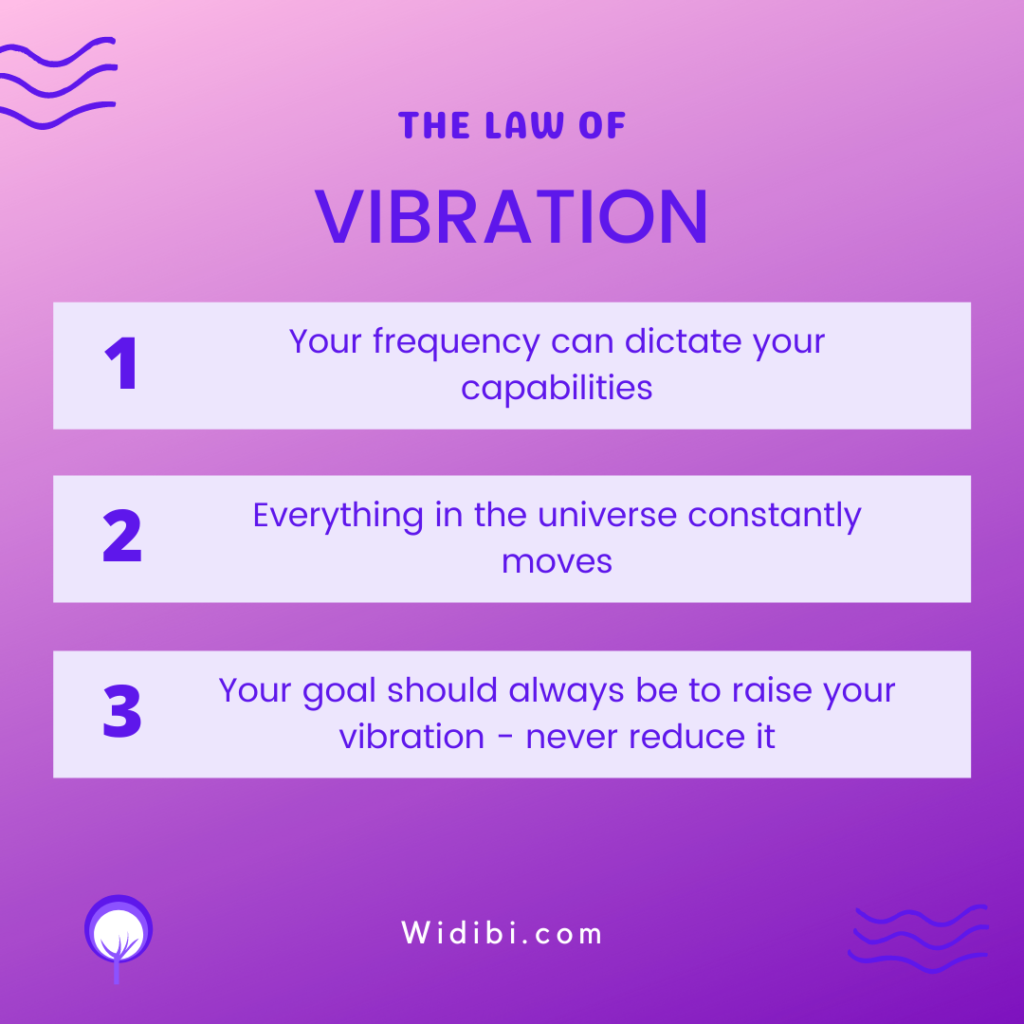
The law dictates that even at the smallest level, everything is constantly moving. That doesn’t only apply to physical objects either. Even people have certain frequencies, and a large part of utilizing the law of vibration involves raising your own.
It’s believed that your frequency can dictate your capabilities. You might give off the correct vibrations to get the job of your dreams but may not be on the right level to keep hold of those jobs once you have them. It can apply to anything, too, spanning money, love, and indeed every facet of your lifestyle.
How to Apply the Law of Vibration
Most of the techniques people associate with well-being are, either intentionally or incidentally, designed to raise your vibration. The goal is always to increase your vibrations, never to decrease them, as the higher they are, the more you can expect to achieve. The seven chakras focus on energy points, while yoga is also a great way to raise vibrations and reach new levels of attainment.
3. The Law of Attraction
Almost certainly the best-known universal law of these twelve, the law of attraction is the one that gets people interested because it’s the most mainstream way to get what you want with the power of the mind. Uses extend from getting someone to call you or removing someone from your life to changing your job into your dream one and speaking your dreams into existence.
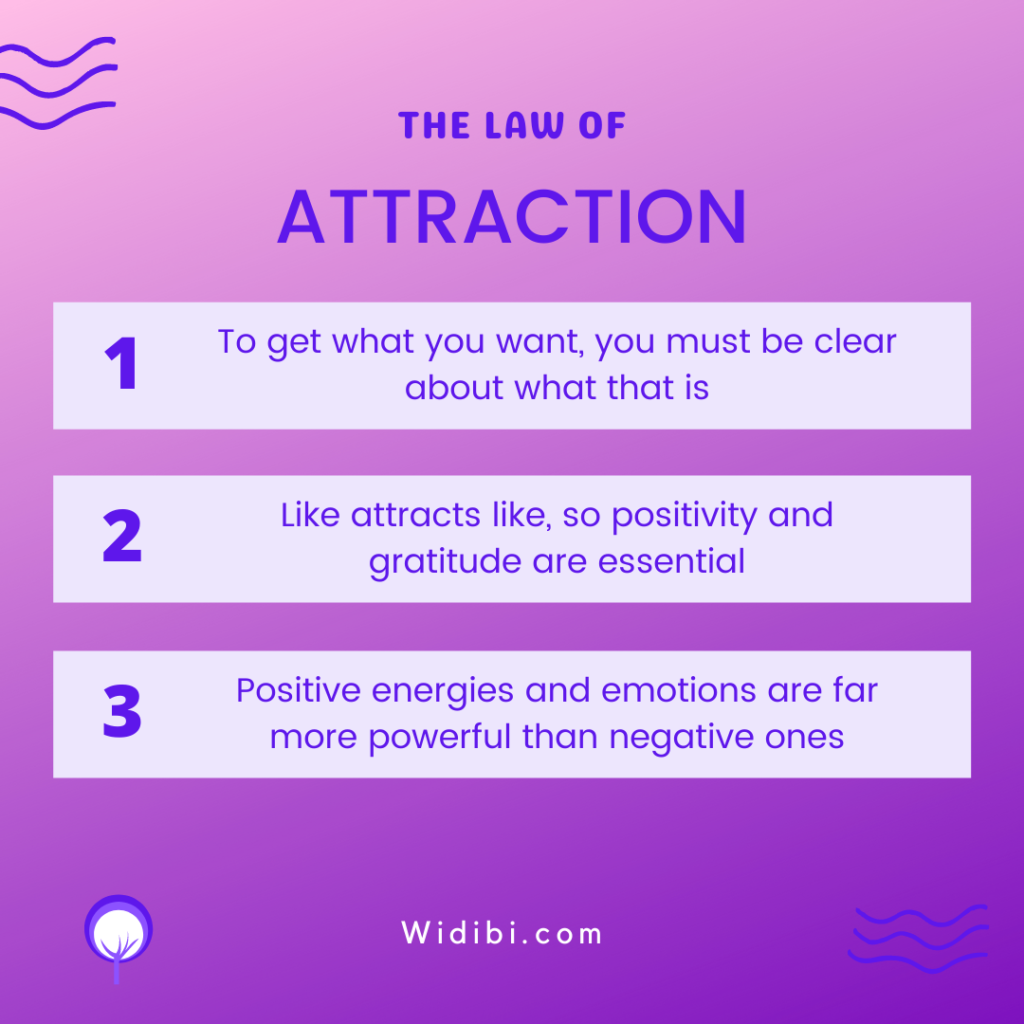
Perhaps the most relevant book of all in terms of universal laws is The Secret by Rhonda Byrne, which went on to become one of the best-selling books of all time. More people know of this universal law than any other, and it’s not difficult to figure out why.
The law of attraction encompasses many techniques and ideologies. If you’re into numerology, for example, our article on the meaning of 777 in the law of attraction is a great place to start – and it’s one of the thousands of important numbers that can have a huge impact on your life if you’re open to working with the universe.
How to Apply the Law of Attraction
As the most prominent of the universal laws, there’s no shortage of guides and information out there for anyone that wants to apply the law of attraction. We discuss doing so in-depth here at Widibi, so do feel free to take a look around! If you want to get started immediately, I’m personally happy to recommend the 5×55 manifestation method, along with the 369 method. I’m also a big fan of manifestation lists, together with my own twist on them – the rotating affirmation list.
4. The Law of Correspondence
Perhaps the most important thing to know about the law of correspondence is that what happens on the inside affects what happens on the outside, and it resonates throughout the entire universe – and not just the physical world around us. It’s at this point that you’ll notice that many of these universal laws are interconnected – the law of divine oneness relies heavily on demonstrating empathy to receive it, while the law of attraction thrives on positive thought to ensure positive outcomes that return in our direction.
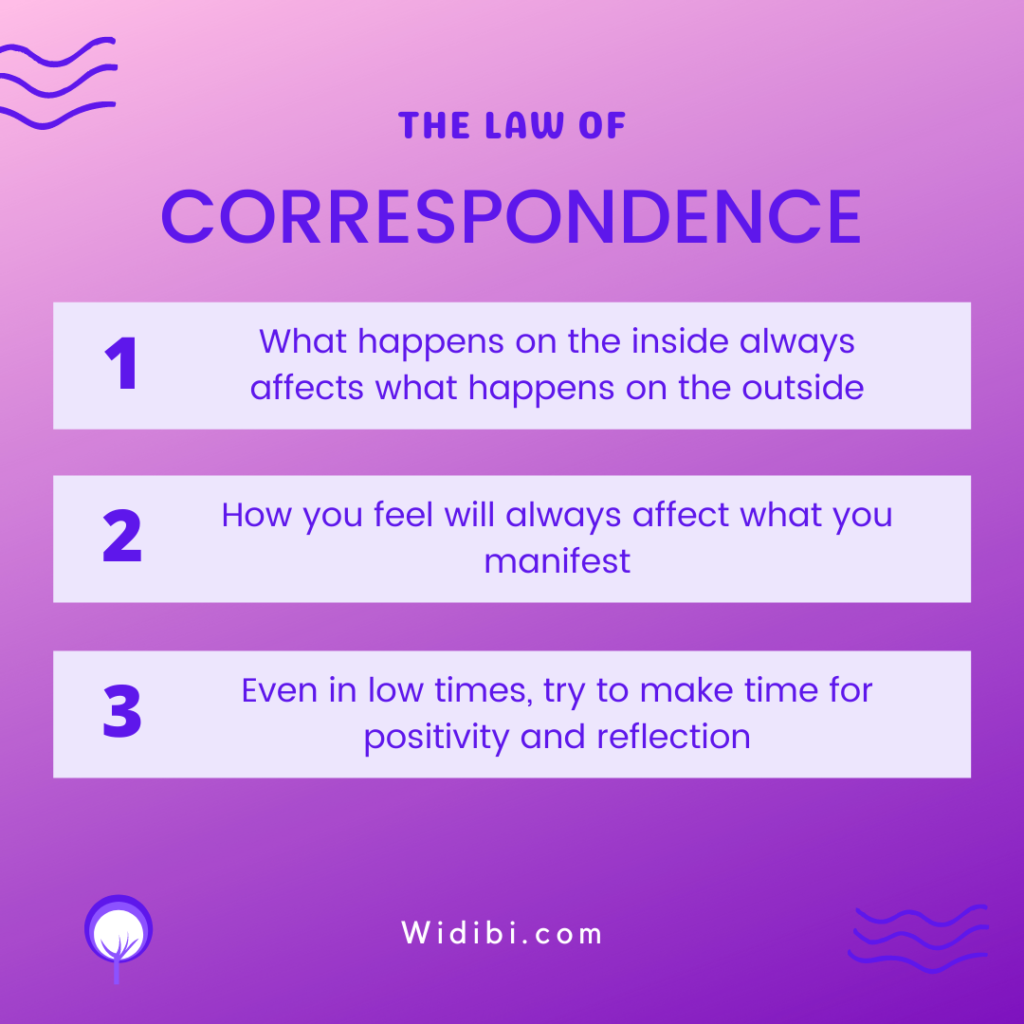
How you feel reflects how you manifest, and that can often be a difficult thing to accept. I can speak from experience when I say that down periods happen, sometimes without reason. It’s easy to dwell on what we don’t have or what we’d like to happen, but the law of correspondence dictates that nothing much will change. The law of correspondence essentially means that you should take time out of your day to focus on the positives or to celebrate what you have to attract more of it.
How to Apply the Law of Correspondence
Much like the law of attraction, the law of correspondence requires people to actively participate in making things happen around them. If you’re down, I know it’s easier said than done to pick yourself up. However, always remember that positive energies far outweigh their negative counterparts. It’s something of a failsafe to ensure you can’t manifest bad things for others, but it also means that a few minutes of positivity and inspiration can overpower hours of being down in the dumps.
5. The Law of Inspired Action
Once again linked to other universal laws, the law of inspired action encourages people to take the steps required to overcome the barriers between them and what they want. Law of attraction experts would say that you really can manifest anything. They could well be right, but the loftier your manifestation ambitions, the longer they will take.

This is because you might decide to leave your life improvements up to the universe alone. One example I’ve used on numerous occasions across the site is that of wanting to become a doctor when you’ve never been to medical school. You literally cannot become a doctor without the requisite training and qualifications, or if you do, you probably won’t remain one for all that long.
While the universe doesn’t necessarily follow the same physical rules we adhere to, it can recognize when certain things have to happen before other things can. That’s why you can encounter manifestation obstacles.
The law of inspired action is all about giving the universe a helping hand. There might be a reason why you can’t apply to and attend medical school. In that case, it may make sense to leave it up to the universe. However, if all that stands between you and becoming a doctor is filling out the application, it’s time to use the law of inspired action. You have a goal, you’re clear in your desire, and you don’t need the universe to set you on your way.
If you can identify what it takes to make your dream happen, there’s absolutely no reason not to take those steps.
Furthermore, it doesn’t have to be part of a plan. Sometimes you need to follow your gut. Do you feel like you need to do something, but you’re not sure why? Don’t dwell on the “why.” Instead, just do it, safe in the knowledge that the law of inspired action will ensure you see results you might not even have predicted yet.
How to Apply the Law of Inspired Action
Applying the law of inspired action is all about doing things when you feel like they’re the right thing to do, even if it might not yet make sense in the grand scheme of things.
The universe doesn’t communicate with us verbally. In most cases, it does so through signs and often double numbers. However, it can just as easily present an opportunity before you. You might not know why it’s there, but you’ll feel like you have no choice but to take it. An open mind is essential to the law of attraction, so get out of the habit of questioning why these opportunities present themselves. Instead, grab them with both hands, safe in the knowledge that your inspired actions are part of a bigger plan for your greatest successes.
6. The Law of Perpetual Transmutation of Energy
We now come to energy, the building block of just about everything. Your ability to manipulate and downright take advantage of universal laws comes down to how you handle the energies inside you and all around you.
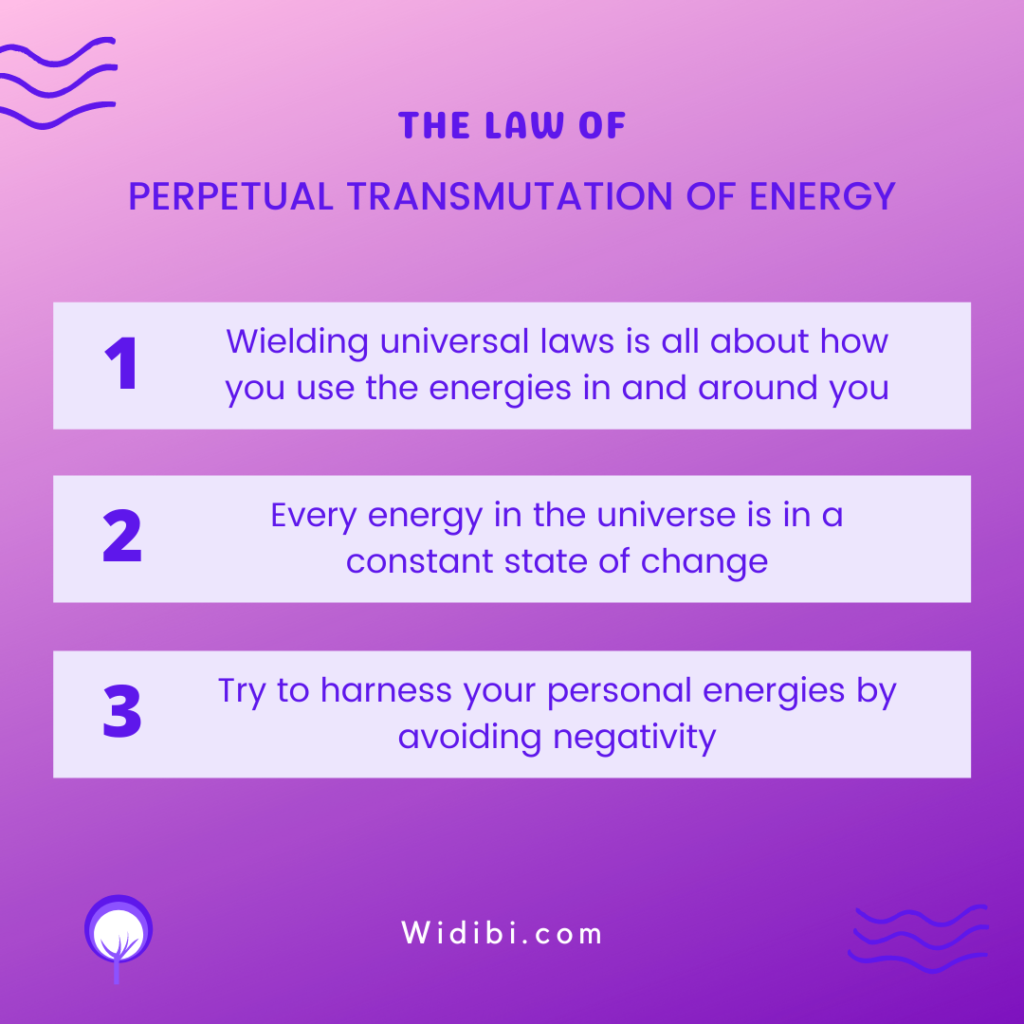
The law of perpetual transformation of energy covers the fact that everything in the universe is always changing. Energy doesn’t remain the same – it’s there to be manipulated, and if you’re not actively doing so, you’re missing out. Furthermore, energy is easily manipulated.
Sometimes you feel bored because there’s nothing to do. At other times, you’re bored because of the things you’re doing or the people you’re with. That’s because their energies are manipulating yours. The same applies to excitement. If you’ve ever been to a massive sporting event and felt the ‘electricity’ in the stadium, that’s you thriving on the energy of others with similar interests.
Oftentimes, no matter how you feel at any given time, the energy you surround yourself with can change things on a subconscious level. That might mean watching a comedy because you need a reason to smile or putting on old songs when you’re feeling nostalgic.
How to Apply the Law of Perpetual Transmutation of Energy
With the law of perpetual transmutation of energy, it’s all about understanding that you have more control over the energies around you than you might think. Some things make you happy, and others make you sad. Where possible, avoid the things that make you feel a certain way if that’s not what you want.
That won’t always be possible, of course, but it’s a great time to reiterate the importance of finding time to feel the way you want to feel. People meditate, in part, because it gets them into a certain headspace. It’s time away from distractions that they can spend on what makes them feel good. Even if you don’t or can’t meditate (yet – it’s not as hard as you might think), minutes used adding to your vision board or jotting in your manifestation journal is time well spent when you want to harness the energies around you and transform them to your benefit.
7. The Law of Compensation
The law of compensation dictates that the efforts you make will return to you many times over. It underpins the laws of attraction and correspondence and is vital for both. Essentially, if you do things with happiness and positivity, you’ll receive happiness and positivity in your life. That’s one reason why it’s so vital to stay positive when manifesting, as your manifestations will be both better and faster given that good energies are so powerful.
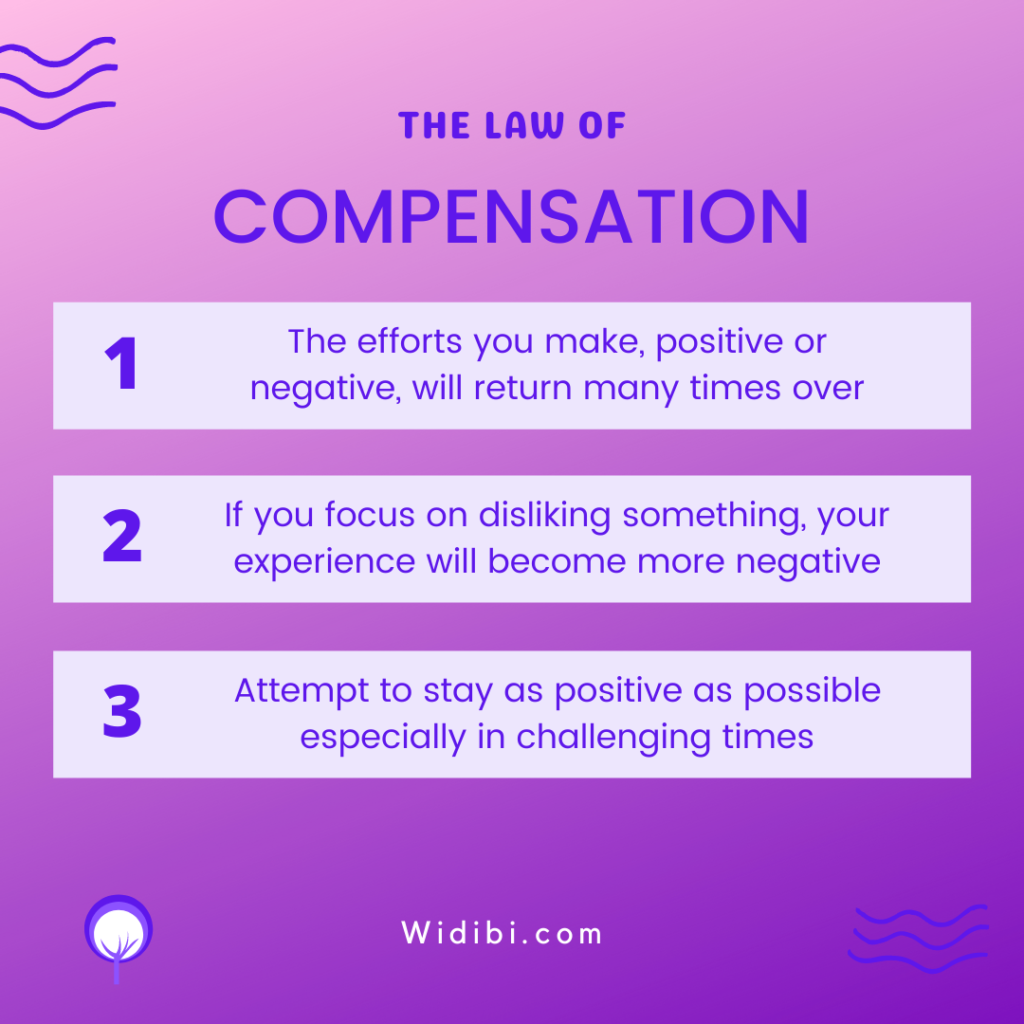
Negativity also plays a part in the law of compensation. If you’re constantly in a state of wanting something rather than having it, the universe will do all it can to ensure you keep on wanting. If you have negative thoughts about things, it will work to ‘help’ you receive negativity from them.
Have you ever had a job you didn’t like? More importantly, have you noticed how from the moment you decide you hate it, the job seemingly gets worse? It’s not necessarily solely related to the law of compensation. Your attitude likely changes, and your respect for and, therefore, treatment of colleagues might suffer. However, that’s also the law of compensation at play.
How to Apply the Law of Compensation
The old saying “you reap what you sow” comes to mind when applying the law of compensation. Consider the law of divine oneness discussed above. It encourages you to demonstrate empathy, love, and understanding. In the law of compensation’s context, that’s what you can expect to receive in return. As noted, the law of attraction encourages positivity and gratitude – both the kinds of emotions you’d hope to play an integral part in your life.
So, applying the law of compensation simply requires you to actively manage your outlook. Sure, you might be the kind of person that’s happy all the time and sees the good in everything you do. You probably noticed that good things had a tendency of happening to you, even before you knew that universal laws were a thing. That’s because the 12 universal laws are in effect whether you’re actively working on them or not.
However, for most of us, the law of compensation might require an element of direct thought. That’s why the aforementioned book, The Secret, can serve as such an excellent starting point not only for the law of attraction but also for the eleven other laws. It reminds you to take control of your attitude and to say ‘thank you’ in many more situations – even those that may not have previously warranted doing so.
It means being nice, being happy, and being good. And if you can’t do it all the time, practice until it becomes a habit!
8. The Law of Cause and Effect
‘Every action has an equal and opposite reaction.’ That’s Isaac Newton’s third law of physics – more on him later. The law of cause and effect means that every action you take, whether deliberately or subconsciously, will result in a reaction of sorts.
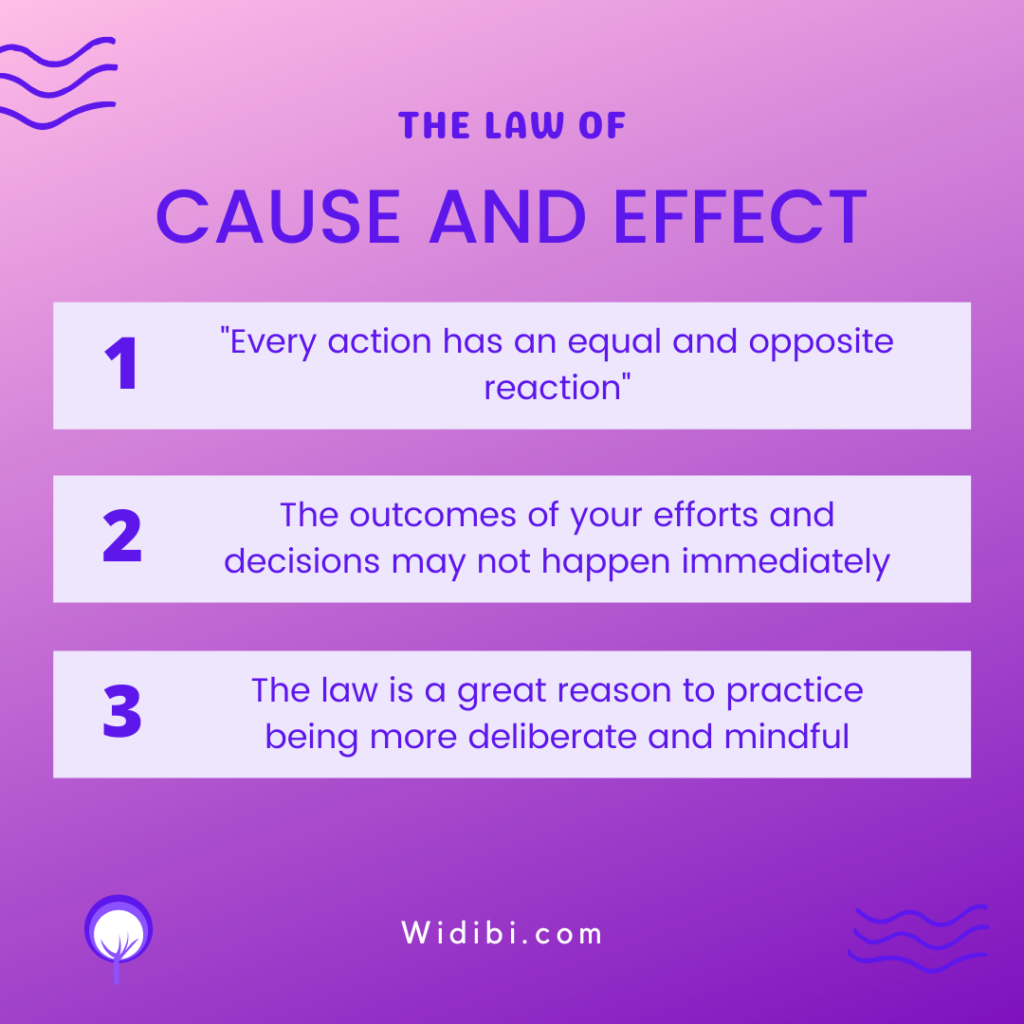
It doesn’t necessarily mean that the reaction will come immediately. Push someone, and the chances are they’ll push you back within seconds. Hold the door and wish good morning to someone at work even though you don’t recognize them, and they might be sitting at the other side of the desk when you go for your next promotion.
There are countless tales throughout the media of how one action had extreme consequences, some of which could have been explained away as coincidence. However, in the law of attraction, there’s no such thing as coincidence – only synchronicities – and the law of cause and effect is one of the primary reasons why. Oh, and if you want to see the law of cause and effect in action, and don’t mind Ashton Kutcher, give The Butterfly Effect a watch.
How to Apply the Law of Cause and Effect
The law of cause and effect, supported closely by the law of inspired action, encourages us to be more deliberate in what we do. There’s no way of telling exactly how a certain action will play out, but you’ll gain a greater understanding if you accept that there are numerous potential outcomes.
That can all begin simply with mindfulness around the obvious ones. If you stand in the shower and turn it on, you get wet. The same applies if you decide to go out in the rain.
The law of cause and effect is also a great reason not only to be more deliberate but also more mindful. It feels like everyone learns at some point that actions have consequences, usually through an unforgettable life event. As such, there’s no time like the present to appreciate that what you do will come back to you, so it’s best to err on the side of positivity!
9. The Law of Relativity
The law of relativity dictates that everything is literally relative, and the idea of comparing two things only works on a personal level. In reality, everything we perceive is entirely neutral, especially in the universe’s view.
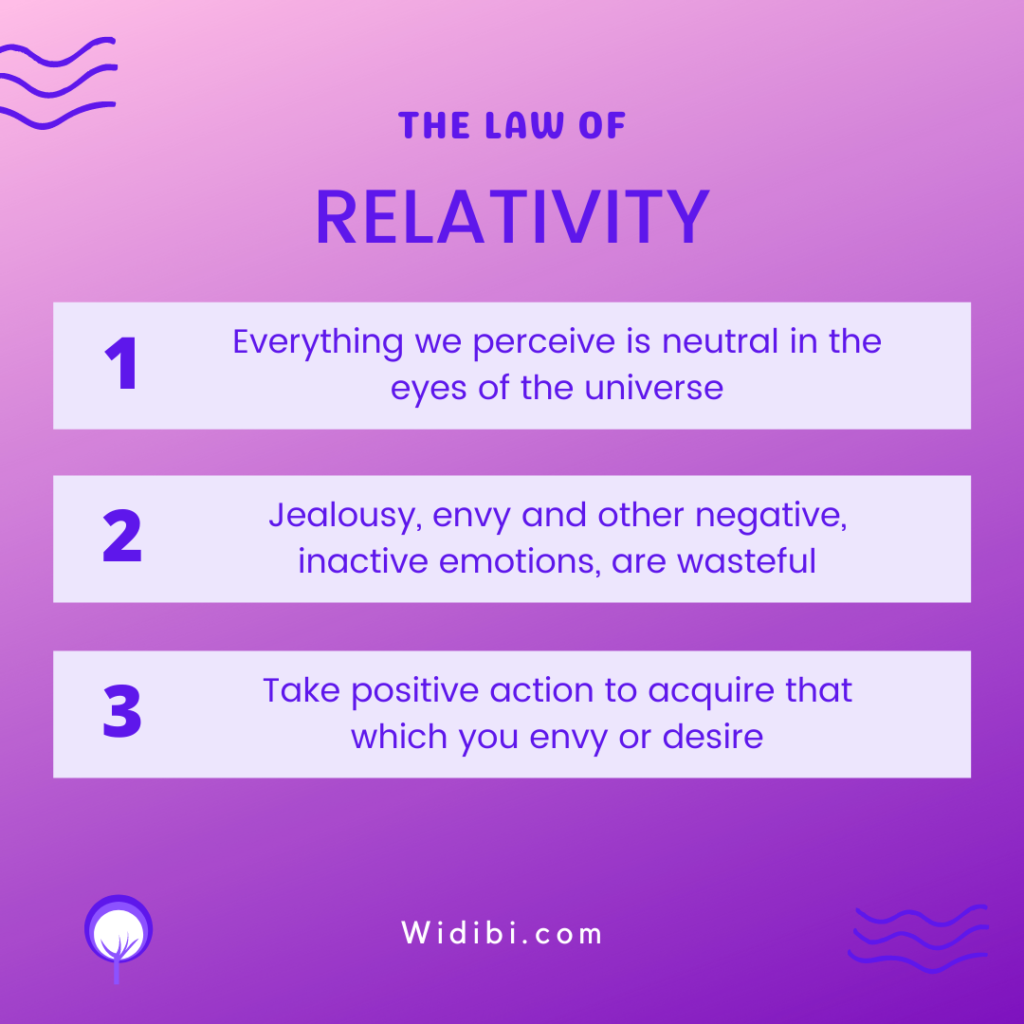
Not to be confused, of course, with the theory of relativity, this law is a reminder of the abundance of the universe. Don’t concern yourself with someone having more of something than you. Focus instead on the self and never forget that the universe has everything you could possibly want – it’s merely a case of going out there and getting it.
This law has made numerous appearances throughout history in different guises. I would even consider “thou shalt not covet…” of ten commandments fame as an interpretation of the law of relativity. In effect, your neighbor having something means nothing, and you definitely shouldn’t waste time and energy wanting it.
Indeed, aligned with the other universal laws, you shouldn’t spend all that much time ‘wanting’ anything. Wanting implies not having, and if that’s the kind of energy you put out to the universe, you can guess what you’ll get back.
If you’re not content with what you have, you should take steps to remedy that. Make the universe aware – as far as it’s concerned, with everything being neutral, you already have what you want until it understands otherwise.
How to Apply the Law of Relativity
Applying the law of relativity generally comes down to controlling yourself and your thoughts. Envy, jealousy, and all those other negative emotions don’t get anyone anywhere, and you don’t need to subscribe to the universal laws school of thought for that to remain the case.
Neither jealousy nor envy are active emotions. They only matter when you use them to spur you on to do something – or take inspired action, as outlined in the fifth point. A further negative action would be to steal that of which you’re envious – but don’t do that. That’s where the law of cause and effect takes over, and not in your favor.
Instead, take positive steps to gain what it is you envy and do so empathetically. Remember, you can always call on the universe for assistance through manifesting, safe in the knowledge that anything and everything you could want is there for the taking (just not unlawfully!).
10. The Law of Polarity
The law of polarity dictates that everything in the universe has an opposite. That’s not to say you have an evil twin lurking out there somewhere in the world, but everything from emotions to experiences have two different sides.
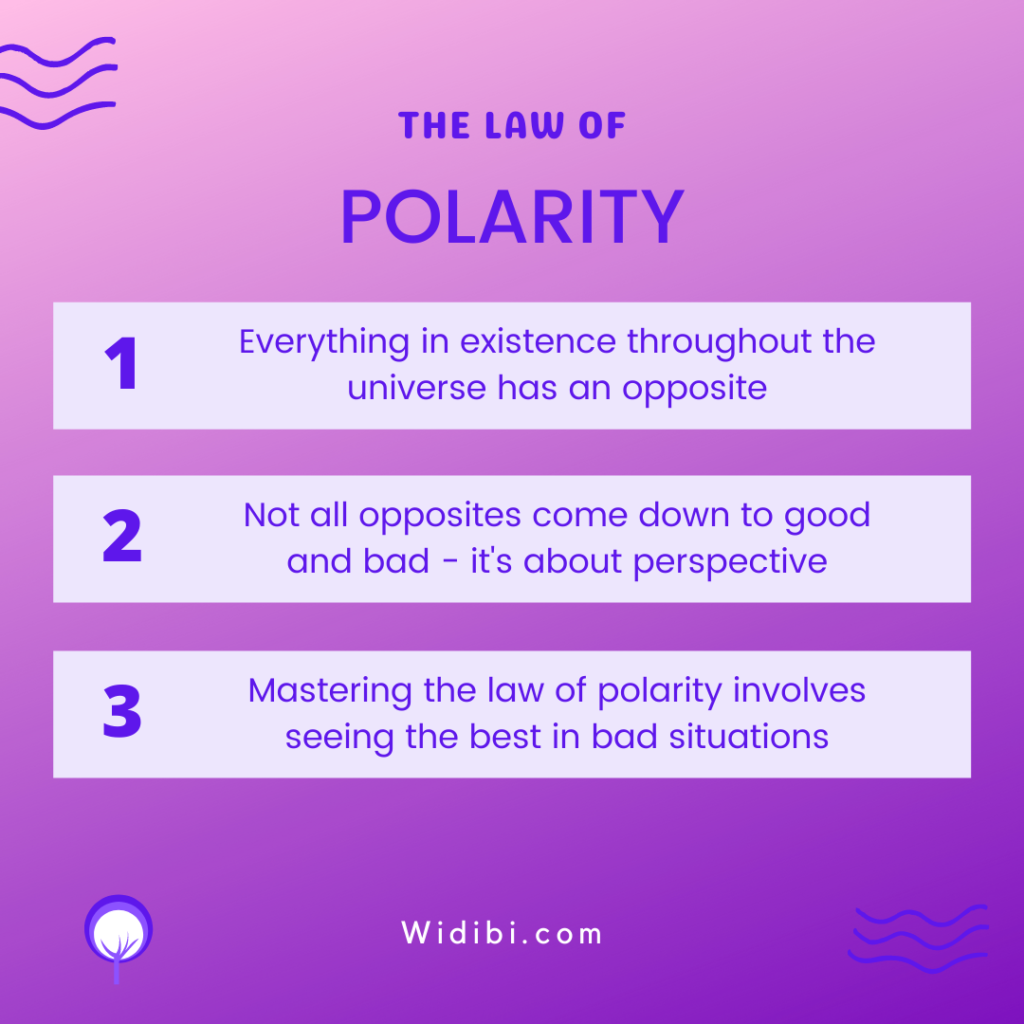
It doesn’t always come down to positive and negative, but it often will, and even that is dictated by perspective. Personally, I enjoy the sun and can’t stand cold weather. Hot and cold are opposites, but I see one as being more positive than the other.
Most opposites are self-explanatory – good and evil, early and late, and so on. However, this universal law dictates that you should, once again, have more of an open mind when tackling the challenges that face us. When there are two sides to a coin, you have the ability to decide whether you prefer heads or tails.
How to Apply the Law of Polarity
The law of polarity and its application all comes down to the presence of mind. It’s all about finding the good in the bad or making decisions with a view to all possible outcomes.
These universal laws all apply in various ways and often interact closely with each other. However, they cannot tell you how to feel, instead only working for you based on these feelings.
There’s no way to escape the fact that negativity happens, and it matters. You can stick as closely as possible to the teachings of these laws and the thousands of guides and suggestions out there for wielding each law individually. However, there’s no accounting for surprise, and things may not be perfect forever.
To truly master the law of polarity, you need to be willing to apply the concept of opposites to bad situations. If you got rejected from a job application, the universe clearly has bigger plans for you. If you’re enduring a breakup or divorce, your positive path is either with someone else – perhaps a twin flame – or simply without the other person in your life.
The law of polarity can be one of the most challenging, especially when required to put a positive spin on things, but that’s a large part of what makes it so powerful.
11. The Law of Rhythm
The law of rhythm, above all, dictates that nothing ever truly stays the same. Just as the law of perpetual transmutation of energy dictates that the energies in and around us are always moving, the law of rhythm introduces the concepts of change and cycles.
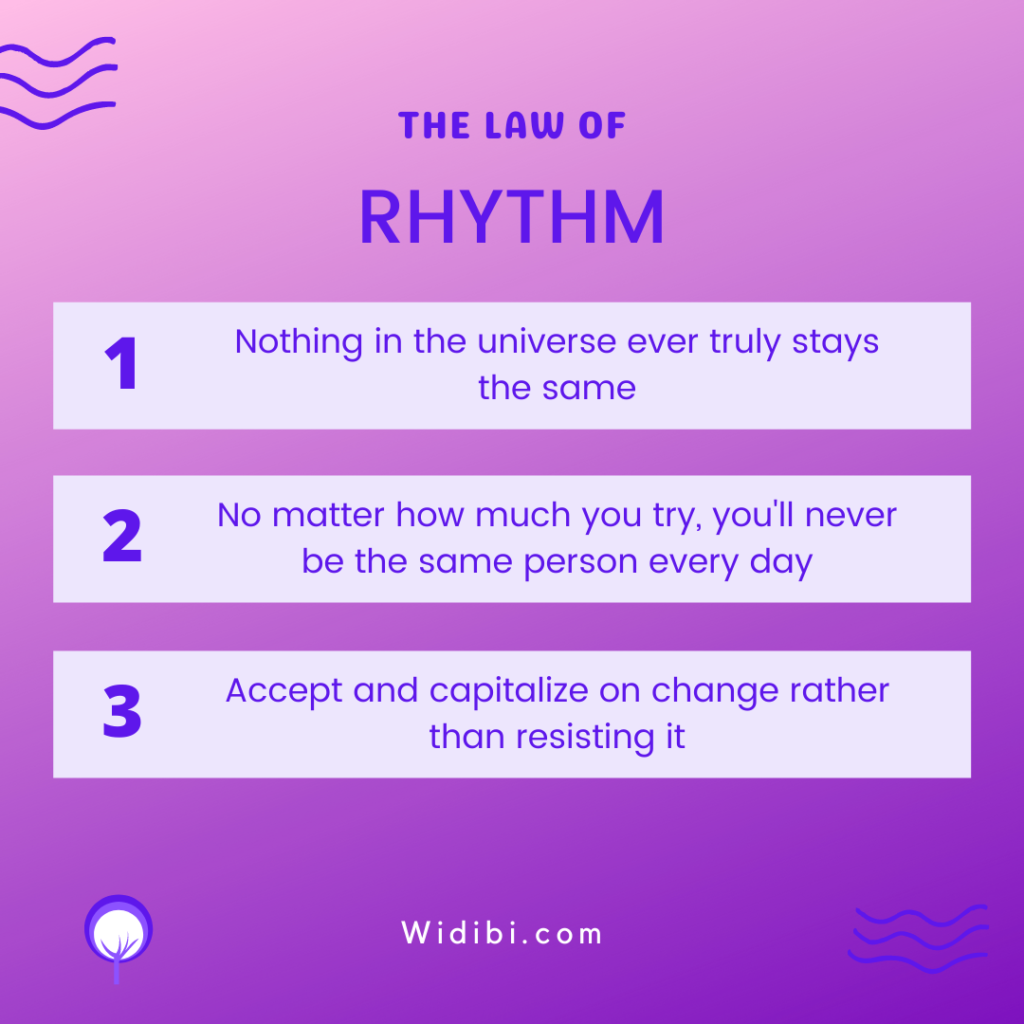
This law brings to mind the quote, ‘If you stand still, there’s only one way to go, and that’s backward.’ I had to look up the source of this particular piece of wisdom, and it turns out to have come from none other than iconic England goalkeeper Peter Shilton. You may not have heard of him if you’re not into soccer, but he was massively successful in his field, and he knew a thing or two about setting and achieving goals and not just saving them.
I believe that it’s important to try to end every day as a better person or in a better situation than when you started. That doesn’t have to mean massive, sweeping changes. If I get a post up on Widibi in a day, I have a bigger, better website than I did yesterday. That counts.
The law of rhythm is just like the seasons – very few countries have the same weather twelve months of every year. Being English, Mr. Shilton would be the first to agree. You can’t be the same all the time, no matter how hard you try.
How to Apply the Law of Rhythm
Implementing the law of rhythm in your life is all about accepting that things do change, and it’s about how you deal with them. As with most challenges in life, it’s often easiest to start with yourself. Like it or not, you’re not always at peak form. We all have off days. We can all start to feel run down. It’s critical not to continue with business as usual in the face of adversity. Be willing to adjust your efforts and your energies in a way that makes sense to the task at hand.
You might be a workaholic, but you’ve used so much energy to keep that up that you’re no longer operating at peak performance. Use the law of rhythm and take a break. Notice the signs and adapt accordingly. If your instinct tells you it’s time for a rest, you might quickly learn that it can be better to do nothing at all than to try to perform at your peak when you only have 50 percent to give.
12. The Law of Gender
The law of gender actually has little to do with the concept of male or female in people. Instead, it’s a universal observation that everything contains both masculine and feminine energies. Most importantly, it’s all about balance.
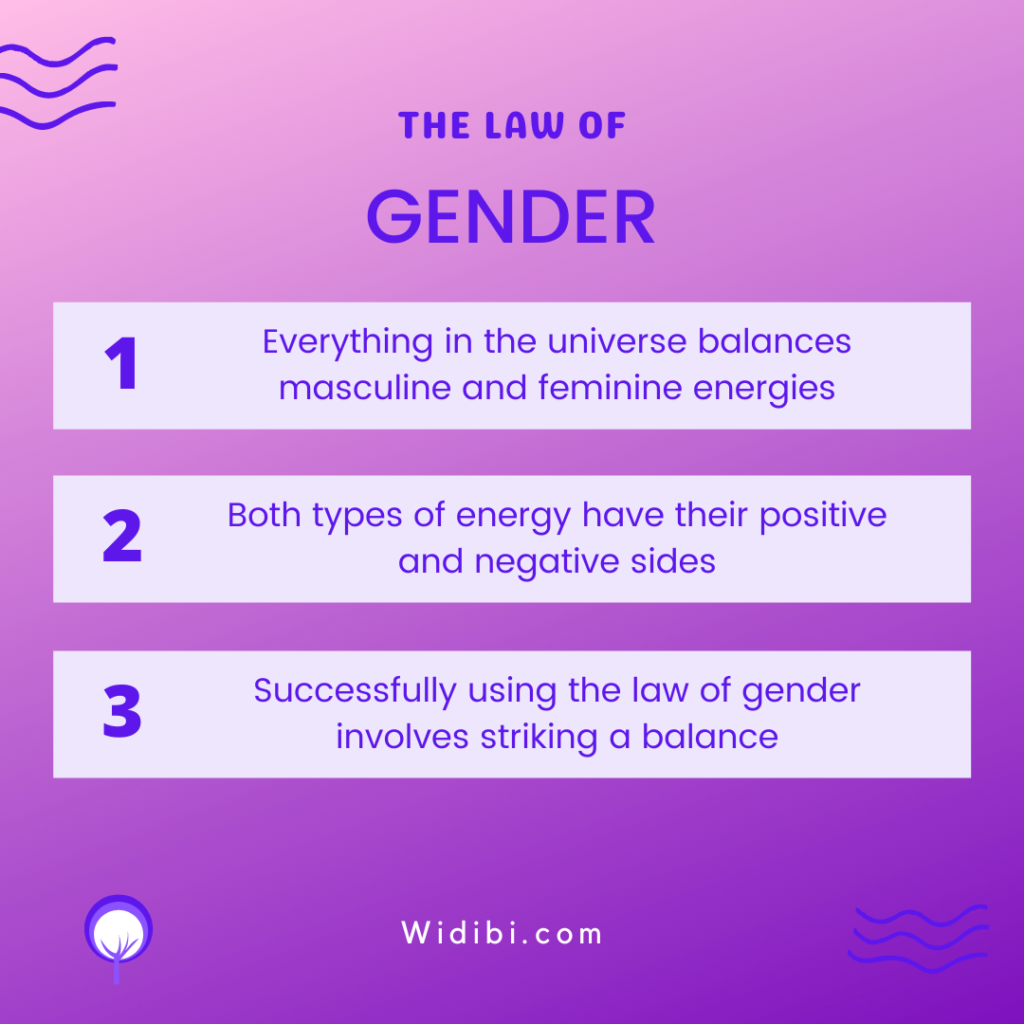
Traditionally, both sides of the law of gender have their positives and negatives. First, it’s vital to detach the concept of the law of gender from its ‘human’ forms. Think of this universal law more like masculine and feminine forms in language.
From there, positive masculine energies tend to involve creativity, inspiration, and vision. At the negative end of the spectrum resides emotions such as anger and conflict.
On the feminine side, positive energies include intelligence, leadership, and instinct, while their negative counterparts can incorporate a loss of control or a detachment from the nature around us.
Historically, these traits may have been more closely associated with males and females at a human level. However, anyone can experience any combination of them regardless of the impact gender has on their life.
How to Apply the Law of Gender
The law of gender all comes down to balance. Even if your traits are all positive, there is such a thing as too much of a good thing. Implementing the law of gender comes down to ensuring that you don’t rely too heavily on just one side of this particular energy spectrum. By all means, be creative, but not at the expense of being analytical. Follow your instincts, but not without due consideration for logic.
People are wired differently, and it’s not as easy as splitting their traits into masculine and feminine. There’s nothing wrong with being better at some things than others. Nevertheless, explore how these energies apply to you and make adjustments where you can to ensure you’re making the best of both sides.
Where Did Universal Laws Come From?
So, you might be wondering who created the 12 universal laws. It’s a somewhat unique question, as the whole point of these universal laws is that they’ve been around for as long as the universe itself. As such, the laws themselves existed long before there was a human being around to ‘create’ them.
Nevertheless, none other than Isaac Newton is credited with their discovery or creation. Newton rivals the likes of Da Vinci for famous discoveries, and he’s perhaps best known in the mainstream for discovering gravity when an apple fell on his head from the tree above.
Just as with the universal laws discussed in this article, Newton didn’t invent gravity. People weren’t floating around like they’re on the International Space Station until that fateful 17th century day. There were no great celebrations as people walked the earth for the first time with no danger of rising uncontrollably into space like some mundane spiritual ascension.
Dig a little deeper into Newton, and you’ll find just how many of his discoveries have made a genuine impact on the world around us. Calculus, a subject I never dove deep enough into mathematics to explore, was allegedly discovered both by Newton and Gottfried Leibniz, entirely independently of each other.
However, there’s evidence to suggest that while many of Newton’s discoveries and creations contributed significantly to ‘real’ science, his work also touched on what most would consider pseudoscience, such as the law of attraction.
According to that BBC article, Newton’s ego convinced him that he was the only earthly being that could truly interpret god’s creations.
Criticism goes with the territory when discussing pseudoscience. Ask ten people if they use the law of attraction to affect their personal realities, and you’ll probably receive at least three funny looks and a couple of blank stares.
The ‘serious’ sides of Newton’s work are widely accepted, especially when they’re provable. Gravity is an easy sell – something must be holding things down. Likewise, while my knowledge of calculus is limited, it would appear that it, as devised by Newton, played a part in Einstein’s Theory of General Relativity.
So, Are the Universal Laws Real?
Part of me wants to think every law Newton discovered deserves equal respect. However, I always try to provide a balanced view. Some of the greatest individuals in history get it wrong. Some got it wrong a hundred times before they got it right. Fortunately for them, getting it right is what enabled them to go down in history.
Clive Sinclair did wonders for computing in the seventies. He also conceived the Mini TV. In his head, he probably envisioned it as a mobile TV viewing option akin to watching YouTube on your iPhone. Instead, he produced a brick of a device that wasn’t as portable as planned and was more like watching Usenet on the phone from Saved by the Bell.
Alexander Graham Bell invented the telephone. He also spent far too much time attempting to teach a dog to talk. Some might say that one invention did far more for civilization than the other.

And then we have James Dyson. Known internationally for revolutionizing the vacuum cleaner, his domestic chore aspirations were preceded by the Ballbarrow. Novelty TV appearances aside, it never really caught on. His company doesn’t always get it right to this day – they may be highly rated for conventional vacuums, but they’ve failed at every attempt to emulate Roomba’s success in the robot market so far, with the likes of the Dyson 360 Heurist landing firmly in the ‘overpriced rubbish’ category.
So, Newton got a lot right. Does that mean his discoveries and creations were universal successes?
What Did Newton Get Wrong?
There are suggestions that Newton wasn’t entirely correct, even in his most famous discoveries. While he was generally right about gravity, he was wrong about what caused it. Calculus was a great mathematical advancement, but the first formal foundations weren’t established until the 19th century. Indeed, Newton considered its application more for physics than mathematics.
The thing about science is it constantly evolves. Even with ‘proof’, new evidence shows up over time. What was widely accepted changes based on the most recent information. Pluto became a planet upon its discovery in 1930. 2006 rolls around, and it’s a planet no longer. A panel decided it no longer fit the bill. It hadn’t shrunk, but what was big enough to qualify for three-quarters of a century no longer did. Some with far more knowledge on the subject than I still defend its planetary position.
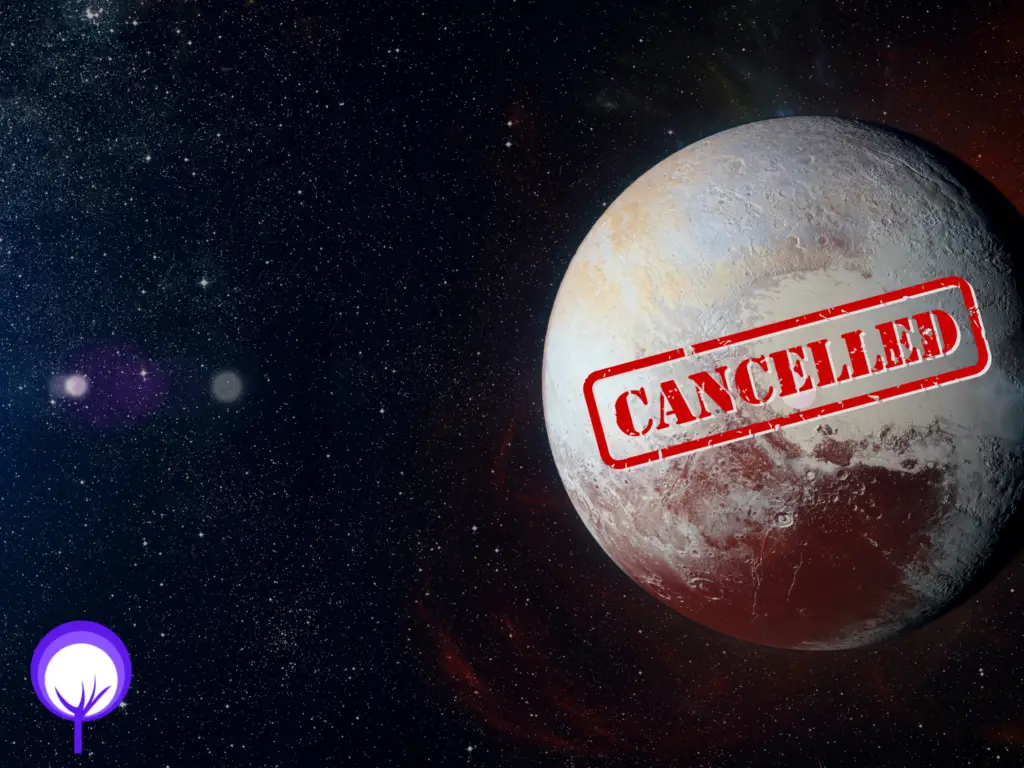
The question becomes whether Newton’s successes in mathematics and science provide the required validity to his discovery or creation of the 12 universal laws.
The law of attraction is the most famous of these laws. It’s bundled into Newton’s Law of Gravitation. I mentioned above how you’ll receive blank stares and occasionally even derision if you mention the law of attraction to multiple people. However, if you refer to gravity as a concept, you’ll discover universal agreement surrounding its validity.
Newton – The Patriarch of a Big Family
Perhaps the most important takeaway from this section is that if someone asked who invented universal laws, I’d say Isaac Newton. However, he provided a baseline. He’s talked about tangentially in the law of attraction, the law of vibration, and the others. However, his work and findings represent only a small part of what the 12 universal laws involve.
Belief in universal laws extends further than Newton’s achievements. I always say that proof of these laws – required to make them laws in the first place – relies heavily on personal experience. If you want to manifest with the law of attraction, you might think it impossible until it happens. Then you’ll confidently write affirmations, create manifestation lists and do whatever technique works for you to make things happen. You can’t prove to someone else they work, but once you’ve seen it for yourself, that’s all you need to know.
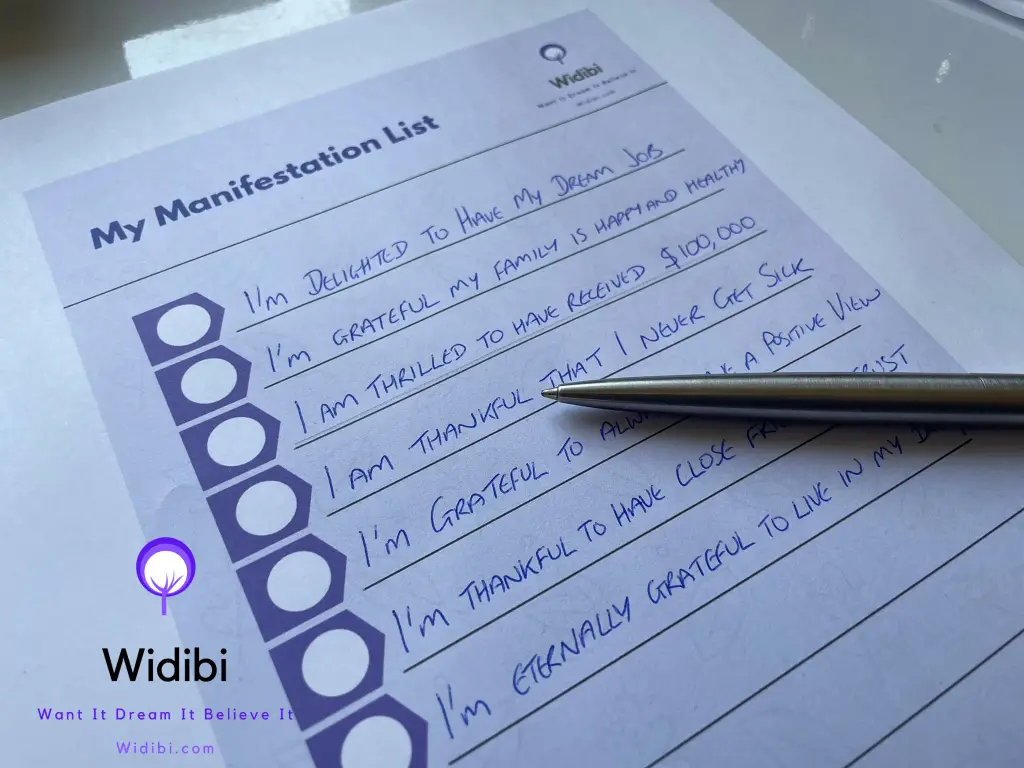
And that’s why the work Newton did was a great starting point but not all that definitive. When you invoke any of the universal laws and gain an element of control over them, you join the family of individuals that have contributed to their evolution over time.
Universal Laws and What They Mean to You
Naturally, the universal laws are open to interpretation, and unlike the laws of the land, they’re open to interpretation. They’re always in effect by definition, but when and how you elect to use them and potentially manipulate them really comes down to you.
For me, it’s ideal to know about them, even if you don’t do anything with or about them.
As I’ve said about the law of attraction in the past, you don’t necessarily need to even believe in these laws to be guided by them. In the law of attraction context, I always say that even if it spurs you on to be more positive and grateful, it’ll have a genuine impact on your life. Even if the universe isn’t working on manifesting what you want, taking the approach needed by the law of attraction can definitely open a few doors for you on its own.
I’d happily extend that to the universal laws in general. The law of gender encourages people to strike a balance in their emotions. Meanwhile, the law of cause and effect suggests that it’s a good idea to think about the outcome of your actions. Both make perfect sense, even if you don’t believe in the laws themselves.
Of course, there’s every chance that you do indeed believe in them and hopefully, what I’ve compiled here plays a part in that. This feature should provide a decent overview of the concept, and the primary takeaway I’d like to impart is that these laws don’t operate independently. By all means, focus on one – almost certainly the law of attraction first – but a working knowledge of what the other laws mean can provide context and guidance.
Most importantly of all, these universal laws are all about you. What works for you might not work for me. Your friends might share their tips and tricks, but you struggle to get going with them. Remember that the techniques you use for universal laws mean different things to different people, and only when one starts working can you be sure you’ve cracked it. That applies to the law of attraction, and it applies just as much to the law of polarity and the law of compensation.
Finally, don’t be overwhelmed. Twelve laws, many of which significantly impact the others, can be a lot to get your head around, but it’s definitely doable. Read, practice, and constantly develop, and you’ll be able to utilize all of them in your favor quickly and effectively.
Quickfire Q&A – Universal Laws
Understanding what the universal laws are is just the first step. It can take a lot more research and personal experience to truly master them. Here are a few quickfire questions surrounding the universal laws, which I’ll be sure to keep up to date over time as the team and I cover the various concepts in more detail.
Is Karma a Universal Law?

Karma, by definition, is not a universal law, but the concept does draw on multiple laws that are. The law of cause and effect, the law of divine oneness, and the law of inspired action immediately spring to mind, reflecting just how closely integrated the twelve universal laws are. All three could be considered as elements of karma, and so while karma itself is not a universal law, knowledge of the laws outlined above can help with understanding karma as a concept.
How Many Universal Laws Are There?
This article refers to twelve universal laws, which is the most commonly accepted number. However, there are also altered concepts such as lists of seven, nine, and even fourteen laws of the universe.
On the shorter side, these lists of universal laws are generally picked out from the 12 featured here. The 14 universal laws take the 12 outlined above and add in the law of belief and the law of gestation. You can find out more about both here at Widibi, but they’re not considered spiritually relevant to most universal law practitioners.
Which Universal Law Should I Focus On?
With the twelve laws of the universe overlapping so closely, the best answer to this question involves treating them all with equal importance. However, doing so can be overwhelming, especially for beginners. If you want to delve deeper into each of the 12 universal laws, I would personally recommend the law of attraction first.
That’s not because it is any more powerful or relevant than the other eleven. Instead, it’s due to the sheer wealth of information out there. If you want to read a book on it, you have the likes of The Secret and Think and Grow Rich to start out with. If you want to start manifesting with the law, you can check out a whole host of methods and techniques here on the site and all over the internet.
In short, there’s more support for anyone that wants to learn about the law of attraction than any other universal law. Furthermore, you can adapt and adjust what you learn from these resources and apply them to the other laws because none of them exist exclusively from the others.
Are Universal Laws Related to the Laws of Nature?
The laws of nature are limited in number compared to universal laws, and they fall more into the category of regular science than pseudoscience. Both concepts share common elements, not least that they dictate how and why things happen. However, while the laws of nature primarily deal with the world around us, universal laws are more concerned with the universe and energies both inside and outside us.
